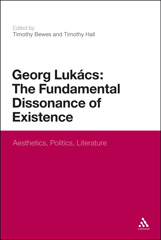Georg Lukacs : The Fundamental Dissonance of Existence
256 p.
The end of the Soviet period, the vast expansion in the power and influence of capital, and recent developments in social and aesthetic theory, have made the work of Hungarian Marxist philosopher and social critic Georg Lukács more vital than ever. The very innovations in literary method that, during the 80s and 90s, marginalized him in the West have now made possible new readings of Lukács, less in thrall to the positions taken by Lukács himself on political and aesthetic matters. What these developments amount to, this book argues, is an opportunity to liberate Lukács's thought from its formal and historical limitations, a possibility that was always inherent in Lukács's own thinking about the paradoxes of form. This collection brings together recent work on Lukács from the fields of Philosophy, Social and Political Thought, Literary and Cultural Studies. Against the odds, Lukács's thought has survived: as a critique of late capitalism, as a guide to the contradictions of modernity, and as a model for a tem
perament that refuses all accommodation with the way things are. [Publisher's text].
Special access authorizations may apply; please contact us for further information.
-
Informationen
ISBN: 9781441187284
THEMENBEREICHE


